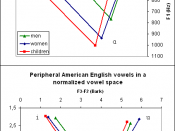The foundation of values is critical to consider in light of the recent terrorist attacks on the United States. People base their value systems on two opposing perspectives: absolute and non- absolute. The absolute perspective views values as an all-encompassing universal standard of principles that exist independently of what individuals believe to be true and can be seen in the Gospel of Matthew. The non-absolute perspective views values as a shifting standard of principles that are based on a continually changing context and can be seen in the basic writings of the Hsun Tzu. With an objective of securing peace in the world one of the two value systems must be superior due to the fact that they contradict and thus cannot both be as effective. If the foundation of values continues to be based in absolute and non-absolute worldviews simultaneously then peace will be much less likely to bring about because conflict will inevitably arise from the contrasting beliefs.
The values based in an absolute perspective are the only ones capable of securing peace in the world, since they are the only ones that create a universal respect for fundamental human rights and freedoms.
In the basic writings of the Hsun Tzu the non-absolute perspective of values can be clearly seen. The first evidence of this perspective on values can be seen in the relationship between ritual principles and the sage. The Hsun Tzu says "ritual Principles "æ are created by sages."à(Watson p.158) This means that the ritual principles are not absolute true beliefs but ones inherited through ancestors that were created by men and change over time. The Hsun Tzu goes on to say "ritual principles are certainly not a part of man's original nature."à(Watson p. 162) This is evidence of the lack of a belief in intrinsic absolute values that are originally built into mankind. Another example of when the Hsun Tzu demonstrates its support of the non-absolute perspective can be seen in the view that humanity's nature is naturally chaotic and hectic and that order must be imposed. If the Chinese worldview supported the view of absolute values it would believe absolute values already provide order and that it would be unnecessary to impose it. The Hsun Tzu reinforces this non-absolute worldview when it defines good and bad by whether or not something is pragmatic. If there was an absolute worldview defining good and bad then whether of not it is pragmatic would simply be irrelevant, because it would be right or wrong independent of individual views. Chinese thought as seen through the Hsun Tzu supports the non-absolute perspective on values.
In opposition to the Chinese perspective on values is the absolute value perspective as seen in Christianity, specifically in the Gospel of Matthew. In the Gospel Jesus teaches a worldview that strongly espouses absolute values. Evidence of this can be seen when in his teaching about the Law, he says "Remember that as long as heaven and earth last, not the least point nor the smallest detail of the Law will be done away with "ÃÂ not until the end of all things."ÃÂ (Metzger and Meruphy 5:18) Jesus here is showing that the Law, his system of values, is absolute and will always exist exactly as it does then. His absolute worldview can also be seen when he discuss the teaching of the ancestors. Here Jesus tells the Pharisees that it is they who disobey Gods commands. (Metzger and Meruphy 15:1-9) The important point here is that the commands come from God, an absolute source. The Chinese worldview also believes values are handed down from their ancestors (Watson p.158) but unlike Christianity it does not hold that the ultimate source of these values is God. Absolutism is once again supported in Jesus' parable The Two House Builders (Metzger and Meruphy 7:24-27). In this parable Jesus shows that those who follow his commands will be like one who builds his house on rock. This rock is a symbolic representation of his absolute system of values. The other man who builds his house on sand is like those who have a non-absolute value system, which can change and fluctuate bringing down the house. The Gospel of Matthew is evidence of Christianity's belief in an absolute perspective regarding values.
These two perspectives on values, absolute and non-absolute are in our world today, yet it is the absolute version that is more conducive to world peace. Some may not see this as so in light of the terrorist attacks that occurred on September 11th, 2001 in New York City and the Pentagon. They would argue that it is precisely because the terrorists had an absolute worldview that they did their heinous crime. This is true that they had an absolute perspective, but not necessarily the correct one. After all due to the fact that it is an absolute worldview only one can be correct and theirs was not. The world needs a universally accepted set of absolute values to insure that peace will exist. If there were no absolute values then any nation could decide, based on their circumstance, that it would be beneficial and pragmatic to attack their neighbor, and do so. If all nations did share an absolute worldview, one that unlike the terrorists respected fundamental human rights and freedoms, then it would go against the nations values to attack their neighbor and would therefore be conducive to peace. The only form of conflict or war that would occur would be those necessary to secure peace and protect the absolute values against those who failed to recognize them (such as the terrorists). These conflicts would be beneficial to ensuring peace. Those lacking an absolute standard of values would also not be capable of functioning fairly and objectively in the global community, which would create a more unstable and un-peaceful world. For example if the members of the United Nations did not have common ground in their mutual acceptance of fundamental absolute values then they would have no way of functioning collectively to preserve these values. Peacekeeping missions that fight aggression worldwide would be impossible.
Without a holding a perspective of absolute values world peace would be much more difficult to ensure. The global community needs to recognize these values and the freedoms and rights that stem from them. Only then will the world be able to rest safe knowing people will not, out of different values based on circumstance; attack their neighbors, strip their fundamental rights, and create war. Absolute values are necessary for absolute peace.
Works Cited Watson, Burton. Hsun Tzu Basic Writings. NY, NY: Columbia University Press, 1996.
Metzger, Bruce; Murphy, Roland. The New Oxford Annotated Bible. NY, NY: Oxford University Press, 1994.





![function Log[z] in the complex plane](https://s.writework.com/uploads/9/97471/function-log-z-complex-plane-thumb.jpg)